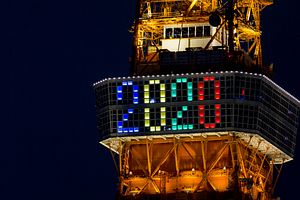On Saturday, Japan’s Foreign Minister Taro Kono gave careful words of encouragement in the wake of North Korea’s decision to compete in the Tokyo Summer Olympics and Paralympics in 2020. Kono said as long as North Korea can participate without breaking International Olympic Committee (IOC) rules, UN Security Council resolutions, and Japanese laws then its athletes should be welcomed as a token of peace.
South Korea and the United States have taken strides to embrace the unexpected easing in tensions with North Korea. A summit between North Korean leader Kim Jong-un and South Korean President Moon Jae-in is planned for April 27 while a summit with U.S. President Donald Trump is expected sometime in May.
The Kim Jong-un’s re-emergence in the international arena with a sudden mood for restoring diplomacy has been viewed with distrust by Japan. Kono voiced concern over North Korea’s tactic of inviting countries into discussions as way to take advantage of their optimism. He added at this stage he’s happy to wait, stressing that there is “absolutely no need to rush” the diplomatic process.
The current wave of opening was sparked by Pyongyang’s willingness to participate in the PyeongChang Winter Olympics, held in South Korea in February. Last month, North Korea agreed to attend the upcoming summer and winter Olympics, in Tokyo in 2020 and Beijing in 2022, respectively. In a meeting in Pyongyang, IOC Chairman Thomas Bach met with Kim Jong-un in a “fruitful” discussion where North Korea pledged cooperation in order to fulfill the requirements needed to partake in the Olympic Games. According to official Korean media, Kim Jong-un is said to have thanked Bach for the IOC’s cooperation irrespective of “any political climate or conditions.”
Despite its self-imposed isolation, North Korea has a long history of participating in the Olympic Games except for two occasions (1984 and 1988) when it boycotted. While Bach highlighted the role sports play in alleviating political tensions, it’s difficult to gauge whether North Korea will be on its best behavior only to ensure its smooth Olympic participation.
While Japan has challenged the sincerity of North Korea’s latest nods toward denuclearization, China has criticized Japan’s cold shoulder. A Chinese Foreign Ministry spokesperson slammed Japan for stirring up trouble while other countries were taking a leap to solve the North Korea problem via dialogue.
In recent months, Kono has raised questions about warning signs that North Korea is preparing to test nuclear weapons again. He said it was “clear” that North Korea was “working hard for the next nuclear test” amid reports that soil removal from a nuclear testing tunnel is underway.
The current move toward reconciliation may be too soon for Japan as only half a year ago its citizens woke up confronted by the prospect of war with North Korea. In September last year Japan was shaken by a North Korean intercontinental-range ballistic missile (ICBM) that flew over north Japan, landing in the sea off Hokkaido. The missile threat sent shockwaves as citizens prepared for evacuation after an emergency text alerting them to an approaching missile.
To make matters worse Japan is still grappling with the ongoing issue of unsolved abductions of Japanese nationals by North Korea from the 1970s. On Tuesday, Japan’s Olympic Committee Chairman and former Prime Minister Yoshiro Mori said the issue of abductions is a major problem that still hangs over the heads of many people in Japan who, as a result, have not been able to enjoy the country’s peace and prosperity since. With little progress being made despite the Japanese government’s extensive lobbying on allies to push North Korea for answers, it’s a national wound that still evokes bitter memories.

































